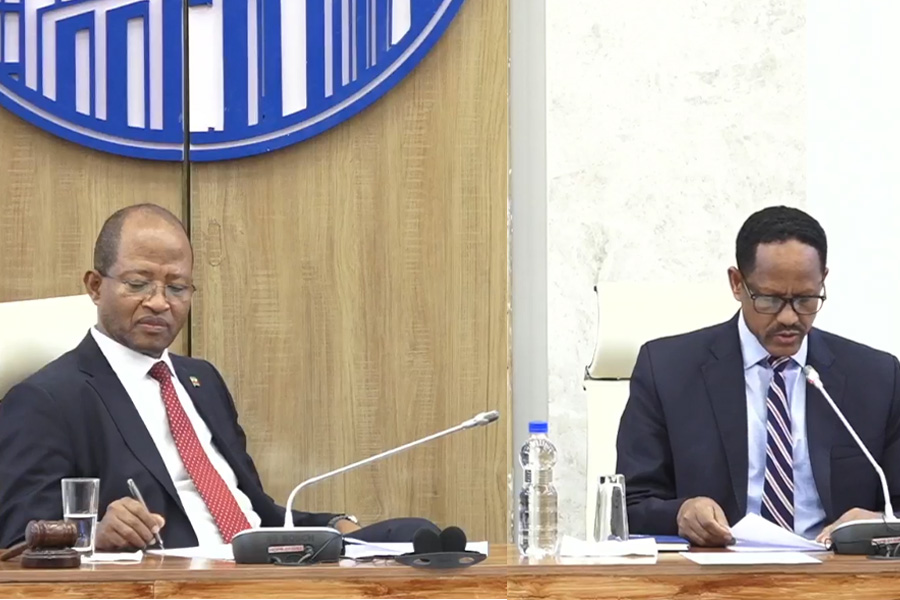
Radar | Jun 11,2024
A bidder stunned land auction participants by offering a record-breaking offer for a plot in the Nifas Silk Lafto District. Her bid, about 744pc higher than the next highest offer, could come with an upfront payment of 63.4 million Br, uncovering the fierce competition and speculative fervour gripping the city's prime real estate market.
Seblewongel Webi set a record by offering 406,667 Br a square metre for a 156sqm plot in Nifas Silk Lafto. Another notable bid in the same district was 306,600 Br a square metre for a 1,475sqm plot.
Last week, a metal box containing bid documents became the epicentre of anticipation and anxiety in a lively hall at the Bole District Land Bureau. Local authorities oversaw the latest round of land auctions, where 743 bidders vied fiercely for 66 plots across four districts of Nifas Silk Lafto, Yeka, Lideta, and Gulele. The event marked the fourth auction since the Addis Abeba City Administration resumed the process after a five-year hiatus.
Nifas Silk Lafto emerged as the hotspot of the auction, offering 39 plots and attracting 634 bidders. The plots varied in size from 98sqm to 1,475sqm, drawing intense interest due to the District's high land value and extensive areas. Locations included Jemo, areas behind Mestawet Fabrica, and Qera on the road to Gofa. The bids were so fierce that some bidders offered prices that outstripped others by hundreds of percentage points.
The auction attracted diverse bidders, including individuals and corporations. Pave Logistics Trading Plc secured a mixed-use plot in Nifas Silk Lafto for 77,777 Br for a square metre. The company's executives disclosed plans to establish a logistics hub, offices, and residential space. Lia Sisay Gudeta emerged as the highest bidder for a different plot in Nifas Silk Lafto, offering 132,000 Br a square metre for a 93sqm space with a 40pc down payment.
Another bidder, Abraham Ayalkbet, secured a 130sqm plot behind Mestawet Fabrica with an upfront payment of 47,300 Br a square meter.
"I'm happy to have won the bid," he told Fortune. "The bid for the plot was intense."
This was the businessman's first success, echoing the tough land market for individual bidders where corporate bidders prevail. Market observers see in these aggressive bids a speculative fervour surrounding prime real estate in Addis Abeba.
Yeka District, offering 23 plots near landmarks like the British Embassy and Minarol Building, attracted 81 bidders. Lideta and Gulele districts, however, saw particularly less interest, with 22 and six bidders, respectively. In Lideta, sites around Lideta Church and near the new Addis Media Network building were up for auction. Despite the lower turnout, substantial bids were made. Fozia Ahmed, an individual bidder, secured a 1,132sqm plot for 132,000 Br a square meter with a 40pc upfront payment.
The auction process was not without its limitations. Five plots in Lideta District were withdrawn due to unresolved transfer issues, and close to 77 bid documents were disqualified for failing to meet requirements.
"We'll likely auction them in the next round," said Chale Abraham, head of land transfers at the Addis Abeba Land Development & Administration Bureau.
Chale remained upbeat about the process, describing the auctions last week as successful despite a two-week delay caused by an insufficient number of bidders.
Of the 66 plots offered, 17 failed to attract sufficient bidders, leaving 49 plots that drew 743 bidders. The bid was initially floated between October 18 and November 1, 2024, but was extended by two weeks to encourage more participation. The fourth-round auction process is set to continue in the coming days, with remaining plots in other districts, including Arada's 17, Lemi Kura's 76, Akaki's 60, Kolfe Keranio's 26, and Bole's 12 plots scheduled to be opened.
The city administration introduced a new payment structure for this auction, requiring bidders to deposit at least 40pc of their bids immediately and the remaining balance over five years. Auction officials believe this shift from previous practices enhances competition and ensures the integrity of the land auction process.
"Several rules have been revised to simplify the land auction process," said Chale.
According to research on urban land monetisation, there are gaps between city-determined benchmark land prices and the actual lease prices offered by bidders. The disparity is particularly evident in the central districts and transitional residential zones. Higher land prices closer to the city centre are attracting commercial developers, potentially accelerating the displacement of lower-income residents to the city's outskirts, where urban amenities are often limited.
With widespread dislocations and resettlement, legal experts are concerned about these trends.
Yared Seyoum, a lawyer familiar with land laws and disputes, fears that city centres are becoming accessible only to the most affluent, leaving out the majority of the population. He also raised alarms about overvalued land bids leading to speculative prices, which could create economic clutter and negatively affect affordability and livability.
"Auctioned land transfers could be a far better option for development due to their transparency and accountability," said Yared.
However, he called for revising land auction rules to include maximum bidding prices to avoid overvaluation and its far-reaching consequences.
"Individual property rights keep being negatively affected," he said, pointing to gaps in law enforcement that allow misuse of power despite successive land-related legal regimes.
He criticised the revised expropriation law enforcement, which he believes has had little benefit for expropriated settlers who find themselves unfairly evicted and stripped of their property rights. According to Yared, land ownership remains in the hands of the state rather than individuals, perpetuating open-ended terms on rights, leading to uncertainty and vulnerability for property holders. He stressed the need to balance development plans with property rights. He called for capable administrators to enforce existing laws for the broader benefit of urban development with citizens in mind.
Local officials have a different perspective. The land auctions are part of a larger land development project to improve the city's economic capacity, investment climate, and competitiveness.
"The city's focus is on enhancing urban development and improving the lives of residents," said Habtamu Tesfaye, bid committee head at the Bureau, seeing ongoing demolitions to facilitate redevelopment efforts as measures with mixed reactions from affected communities.
PUBLISHED ON
Nov 16,2024 [ VOL
25 , NO
1281]

Radar | Jun 11,2024

Fortune News | Aug 12,2023

Fortune News | Dec 23,2023

My Opinion | Nov 27,2018

Fortune News | Nov 24,2024

Radar | Oct 31,2020

Fortune News | Jun 21,2025

Commentaries | Feb 03,2024

Editorial | Feb 29,2020

Radar | Oct 02,2021

Dec 22 , 2024 . By TIZITA SHEWAFERAW
Charged with transforming colossal state-owned enterprises into modern and competitiv...

Aug 18 , 2024 . By AKSAH ITALO
Although predictable Yonas Zerihun's job in the ride-hailing service is not immune to...

Jul 28 , 2024 . By TIZITA SHEWAFERAW
Unhabitual, perhaps too many, Samuel Gebreyohannes, 38, used to occasionally enjoy a couple of beers at breakfast. However, he recently swit...

Jul 13 , 2024 . By AKSAH ITALO
Investors who rely on tractors, trucks, and field vehicles for commuting, transporting commodities, and f...

Nov 1 , 2025
The National Bank of Ethiopia (NBE) issued a statement two weeks ago that appeared to...

Oct 25 , 2025
The regulatory machinery is on overdrive. In only two years, no fewer than 35 new pro...

Oct 18 , 2025
The political establishment, notably the ruling party and its top brass, has become p...

Oct 11 , 2025
Ladislas Farago, a roving Associated Press (AP) correspondent, arrived in Ethiopia in...